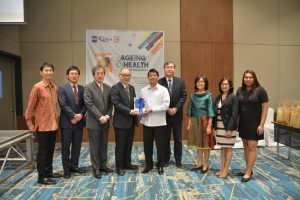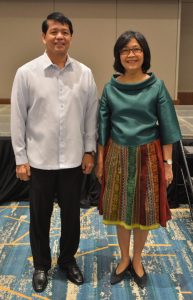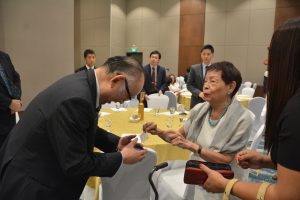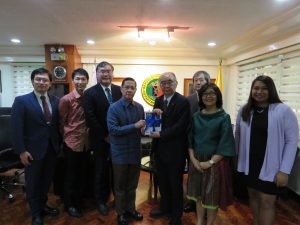
(DEC. 11) — An early morning visit before the forum by Secretary Rolando Joselito D. Bautista of the Department of Social Welfare and Development (DSWD), and a scheduled meeting with Department of Health Secretary Francisco Duque III in the afternoon after the forum, were just two of the positive feedbacks sparked by the study “Ageing and Health in the Philippines: Findings of the 2018 Longitudinal Study on Ageing and Health in the Philippines (LSAHP)” last Dec. 9.
At the forum held at the Makiling 1 Room of the Park Inn by Radisson in Quezon City, Commissioner Karen S. Gomez Dumpit of the Commission of Human Rights (CHR) said CHR will make sure to cite the study to protect the rights of the older persons (OPs).

Teresa S. Cleofe, DSWD Focal Person on Senior Citizen Sector recommended the next interview of OPs include a probe of any experience of abuse. Should there be any, she cited RA 11350 or the National Commission of Senior Citizens Act, for this protects the senior citizens and allows them to exercise their rights.
Meanwhile, Undersecretary Juan Antonio Perez III of the Commission on Population and Development, reacting to the presentation of the study’s findings said, the Philippines must shun age discrimination and look at older Filipinos as “a resource rather than a burden,” since the country faces rapid urbanization.
“Truly our OPs are not yet tired despite retirement. They can still be our partners in development work,” he said.
Hiraiwa Masaru for his part said he hopes the 2018 LSAHP would be thoroughly utilized. He is the Deputy Assistant Minister for International Policy Planning of the Ministry of Health, Labour and Welfare of Japan.

President Hidetoshi Nishimura of ERIA (Economic Research Institute for Asean and East Asia), said the 2018 LSAHP is an important study as “the key to coping with aging is improvement in health expectancy,” and the findings of the 2018 LSAHP is a “beautiful and comprehensive information of the lives of the OPs in the Philippines.”
According to him, the 2018 LSAHP was cited at the recent G20 Summit. The latest G20 Health Ministers Meeting held at Okayama, Japan in October 2019. G20 is a forum of 19 countries and the European Union that together represent most of the world economy.
The 2018 LSAHP is a nationally representative survey of Filipinos aged 60 and over, designed to investigate the health status and well-being of older Filipinos and its correlates. It is part of a comparative study of aging and health in the Philippines and Vietnam and is a collaboration project of the Demographic Research and Development Foundation, Inc. (DRDF), ERIA in Jakarta, Indonesia, and the UP Population Institute (UPPI) of the College of Social Sciences and Philosophy.

Presenting the findings of the 2018 LSAHP at the forum was Prof. Grace T. Cruz, PhD, of UPPI who is the LSAHP Project Investigator. Prof. Yasuhiko Saito, PhD of Nihon University and 2018 LSAHP co-editor, presented on aging in Asia.
Among the guests present at the forum were health professionals, policymakers and organizations providing services for older people, Congressman Carlos Isagani Zarate of the Bayan Muna Party-List and National Scientist Mercedes B. Concepcion.—Mariamme D. Jadloc, images by Jefferson Villacruz
